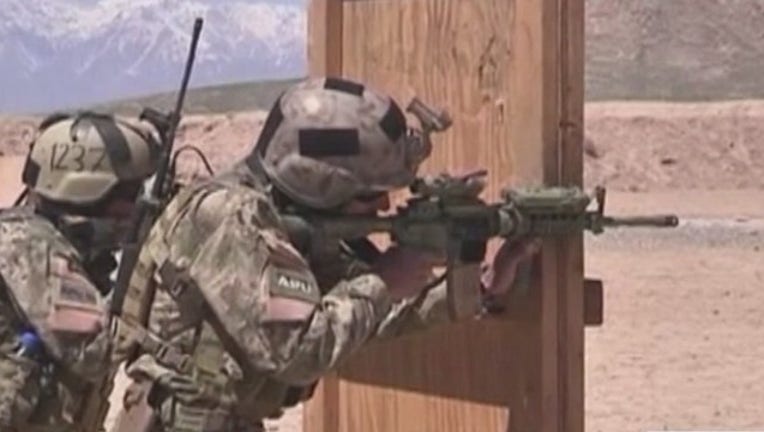Adding 200 more troops to Syria, US deepens involvement

MANAMA, Bahrain (AP) — Drawing the U.S. deeper into the Syria conflict, Defense Secretary Ash Carter announced Saturday he is sending 200 more troops to accelerate the push on the Islamic State's self-declared capital of Raqqa.
The 200, to include special operations troops, are in addition to 300 already authorized for the effort to recruit, organize, train and advise local Syrian Arab and Kurdish forces to fight IS. Carter said the expanded U.S. involvement was approved by President Barack Obama last week.
On his final tour of the Mideast as Pentagon chief, Carter cast the new troop commitment as evidence that the U.S. backs its anti-IS words with military muscle. He offered an extensive defense of the Obama administration's efforts to defeat the extremists, and he aimed sharp jabs at the region's Arab powers, saying they need to stop complaining of U.S. shortcomings and do more to protect their own neighborhoods.
"They need to get in the game," he said.
Speaking at an international security conference known as the Manama Dialogues, Carter also blasted Russia for its role in Syria. He said Moscow had joined the fighting with the stated goals of smoothing the way for a political transition and to combatting the Islamic State group.
"But then it did neither of those things," he said, "and instead has only inflamed the civil war and prolonged suffering of the Syrian people."
Carter said U.S. partners in the Middle East who are serious about fighting extremism over the long term need to build up their ground and naval forces, special operations forces, and defenses against ballistic missiles and cyber threats.
"Given the persistent challenges facing the region - and because the future is always uncertain - developing these core capabilities will be ever more crucial to your security," he said. "You ignore them at your peril."
He did not criticize any Arab country by name, but it is well known that the key U.S. partners in the region are led by Saudi Arabia. Carter pointedly mentioned the United Arab Emirates as an example of how military capability should be developed and used.
"The UAE not only acquires effective capabilities, it puts skin in the game," he said.
In unusually pointed terms, Carter suggested that some Mideast partner nations are disingenuous in their criticisms of U.S. policy.
"I would ask you to imagine what U.S. military and defense leaders think when they have to listen to complaints sometimes that we should do more, when it's plain to see that all too often, the ones complaining aren't doing enough themselves," he said.
He said it is not unreasonable for Washington to expect regional powers who oppose extremism in the Middle East to do more to help fight it, "particularly in the political and economic aspects of the campaign."
Carter said the 200 extra troops going to Syria will help local forces in their anticipated push to retake Raqqa, the de facto capital of the extremist group's self-styled caliphate, and to deny sanctuary to IS after Raqqa is captured.
"These uniquely skilled operators will join the 300 U.S. special operations forces already in Syria, to continue organizing, training, equipping, and otherwise enabling capable, motivated, local forces to take the fight to ISIL," Carter said. "By combining our capabilities with those of our local partners, we've been squeezing ISIL by applying simultaneous pressure from all sides and across domains, through a series of deliberate actions to continue to build momentum," he said.
The coalition of Syrian Arab and Kurdish fighters that has been working with U.S. trainers and advisers said Saturday it will expand operations against the Islamic State group in northern Syria. The predominantly-Kurdish Syrian Democratic Forces, which control most of the frontier with Turkey, announced they were moving to the second phase of their "Wrath of the Euphrates" operations after recapturing dozens of villages from the extremists north of Raqqa.
The coalition said it would now isolate Raqqa from the west.
The military push is complicated by the predominance of local Kurdish fighters, who are the most effective U.S. partner against IS in Syria but are viewed by Turkey — a key U.S. ally — as a terrorist threat.

